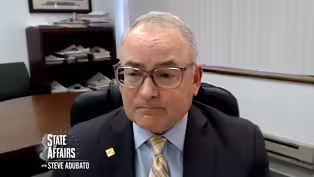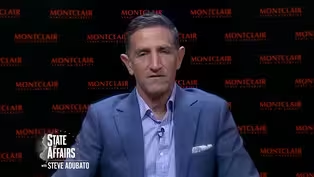State of Affairs with Steve Adubato
Bergen New Bridge and their approach to end-of-life care
Clip: Season 9 Episode 9 | 8m 35sVideo has Closed Captions
Bergen New Bridge and their approach to end-of-life care
Deborah Visconi, President & CEO of the Bergen New Bridge Medical Center, sits down with Steve Adubato to discuss challenges within the healthcare sector and their approach to end-of-life care.
Problems playing video? | Closed Captioning Feedback
Problems playing video? | Closed Captioning Feedback
State of Affairs with Steve Adubato is a local public television program presented by NJ PBS
State of Affairs with Steve Adubato
Bergen New Bridge and their approach to end-of-life care
Clip: Season 9 Episode 9 | 8m 35sVideo has Closed Captions
Deborah Visconi, President & CEO of the Bergen New Bridge Medical Center, sits down with Steve Adubato to discuss challenges within the healthcare sector and their approach to end-of-life care.
Problems playing video? | Closed Captioning Feedback
How to Watch State of Affairs with Steve Adubato
State of Affairs with Steve Adubato is available to stream on pbs.org and the free PBS App, available on iPhone, Apple TV, Android TV, Android smartphones, Amazon Fire TV, Amazon Fire Tablet, Roku, Samsung Smart TV, and Vizio.
Providing Support for PBS.org
Learn Moreabout PBS online sponsorship[INSPRATIONAL MUSIC STING] - Hi, everyone.
Steve Adubato.
We kick off the program talking about the world of healthcare with one of the top healthcare leaders in the State of New Jersey.
Deborah Visconi is President and Chief Executive Officer of Bergen New Bridge Medical Center, one of our partners in the world of healthcare.
Deb, good to see you first.
- Good to see you too, Steve.
And thanks for having me on.
It's always a pleasure.
- You got it, I was saying right before we got on the air, not that anything big is happening in the world of healthcare.
We're taping on the 18th of March.
Number one challenge you and your colleagues in the world of hospitals and healthcare face today is?
- Funding and financing.
- Oh, that money, huh?
- Money.
- How, let me ask you this, how challenging is it to lead at Bergen New Bridge with so much uncertainty around us?
- So, you know, we're used to uncertainty in the world of healthcare.
So, it is always a challenge, but challenges present opportunities.
And so, you know, the key for us here and as leaders in the healthcare space is to make sure that we're always engaging with our stakeholders, with our communities, with our employees, with our patients, to make sure that we continue to be a beacon of health, hope and healing for those that we serve.
So, the ability to lead through change and opportunity, you know, is extraordinary.
Especially these days where, you know, there's threats to our basic funding sources.
So, keeping an eye on the focus, which is to provide extraordinary healthcare for our communities is paramount.
And to, you know, put some of the noise behind us while we continue to engage and embrace the reason why we're here and fulfill our mission.
- Let me ask you this Deb.
We're doing a series called "Tomorrow's Physicians," the graphic will come up, looking at the physician shortage and also the pipeline, if you will, for future physicians, medical school, cost of medical school, et cetera, et cetera.
Talk to us about this physician situation in 2025 for you and your colleagues.
- Yeah, it's definitely a challenge.
There is extraordinary shortages throughout the country in specific specialties, but across every physician type there's shortages.
We have been doing a lot of innovative things, really looking at the pipeline, partnering with medical schools, fellowships, identifying, you know, those that are graduating so we can give them opportunities at our medical center.
We have tremendous partnerships.
We're a clinical affiliate of Rutgers New Jersey Medical School.
So, that partnership does help us recruit providers and doctors to our medical center.
We are looking for loan forgiveness programs, implementing those kinds of things.
We're looking at, you know, the way of life workforce, flexible scheduling, implementing telemedicine, telehealth platforms, leveraging our allied health professionals, like nurse practitioners and physician's assistants, giving our physicians what they need to be successful and to wanna come work with us, whether it's technology, new EMRs, other types of technology that will help make their lives easier and better for them so they can provide that hands-on care.
- The whole question of the aging population, people are living longer and some might say, "Well, that's great, people are living longer."
But healthcare, medical needs become obviously much greater as people get older.
How is Bergen New Bridge dealing with the aging population in and around the community you serve?
- So, you know, we have a very large nursing home here on our grounds.
We have over 400 residents that live here in our long-term care facility.
So, we are very in tune and recognize the growing needs of our aging population, and we're committed to providing that comprehensive, accessible, high-quality care for the older adults.
You know, you mentioned it, but over 17% of Bergen County's population is 65 years or older.
And I'm sure you know this too.
By 2030, all the Baby Boomers will have reached the age of 65.
So, operating one of the largest nursing homes in the state, we serve thousands of low income and vulnerable seniors, many of whom are dependent on Medicare and Medicaid for their care.
And what we're doing is making strategic investments.
Like we have an assisted living that's part of our extended care programs.
We're about to open a PACE program, the program for all inclusive care for the elderly on site right here at Bergen New Bridge, which is a program that offers coordinated, comprehensive healthcare services, allowing seniors to age in place safely while receiving the medical, social, and rehabilitative support that they need.
- The question of trust or distrust in the public health, I don't like saying infrastructure.
I don't know what that, we're not building roads.
The public health universe, your world, the level of distrust, the question about, the graphic will come up: Vaccines, What You Need to Know.
It's a public awareness initiative we're doing.
You've been involved in this healthcare community for a few years.
What is the most important message you would like to share to folks about vaccines, safety, and trusting the system?
- So, as a steward of public health and healthcare in our communities, I would tell our communities that vaccines and really public health are critical in protecting our communities.
Vaccines are one of the most effective tools in preventing serious illnesses, hospitalizations, and deaths from infectious diseases.
You know, we strongly support vaccination efforts, not just for COVID and flu, but all other preventable diseases.
- Measles.
- Measles.
- How the heck did this ever become something other than a public health issue, Deb?
- I think there's, you know, we talk a lot now, and which is a good thing.
We talk a lot about vaccines and their efficacy, and there's a lot more awareness in our communities, which I look at as a good thing.
The more- - It is a good thing.
- The more educated we are, the better decisions we can make.
So, I think, you know, especially with COVID, you know, the advent of COVID and the COVID vaccines and those conversations that we had for the last several years, I think our communities are becoming more engaged and more informed about the right thing to do.
And so I think that has really led to a lot of the conversation around vaccines.
- Deb, when you join us next time, because this is a moving target, as I said, we're taping late in March.
Next time you join us, give us an update on where we are in terms of Medicaid, Medicare cuts, because we don't know where they are right now, and taping a program today that airs later is risky in that regard.
So, come back in a few months when it's clearer where we are and give us an update.
Deb Visconi, I wanna thank you so much for joining us.
We appreciate it.
- Thank you for having me.
- Thanks, that's Deb Visconi, President and Chief Executive Officer Bergen New Bridge Medical Center.
Thank you, Deb.
All the best.
- Thank you, Steve.
Take care.
- You got it.
Stay with us.
We'll be right back.
- [Narrator] State of Affairs with Steve Adubato is a production of the Caucus Educational Corporation.
Funding has been provided by Horizon Blue Cross Blue Shield of New Jersey.
Community FoodBank of New Jersey.
EJI, Excellence in Medicine Awards.
A New Jersey health foundation program.
NJM Insurance Group.
The New Jersey Education Association.
PSEG Foundation.
The Fidelco Group.
The New Jersey Economic Development Authority.
And by NJ Best, New Jersey’s five-two-nine college savings plan.
Promotional support provided by NJBIZ.
And by NJ.Com.
- (Narrator) New Jersey is home to the best public schools in the nation, and that didn't happen by accident.
It's the result of parents, educators and communities working together year after year to give our students a world class education.
No matter the challenge, because parents and educators know that with a shared commitment to our public schools, our children can learn, grow and thrive.
And together, we can keep New Jersey's public schools the best in the nation.
Addressing the impact of federal cuts to SNAP benefits
Video has Closed Captions
Clip: S9 Ep9 | 8m 51s | Addressing the impact of federal cuts to SNAP benefits (8m 51s)
Navigating misinformation in this era of journalism
Video has Closed Captions
Clip: S9 Ep9 | 10m 22s | Navigating misinformation in this era of journalism (10m 22s)
Providing Support for PBS.org
Learn Moreabout PBS online sponsorship
- News and Public Affairs

Top journalists deliver compelling original analysis of the hour's headlines.

- News and Public Affairs

FRONTLINE is investigative journalism that questions, explains and changes our world.












Support for PBS provided by:
State of Affairs with Steve Adubato is a local public television program presented by NJ PBS

